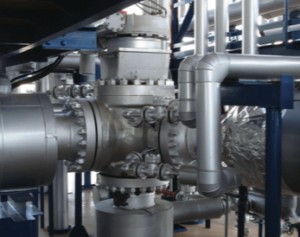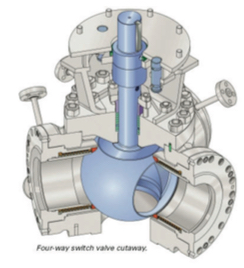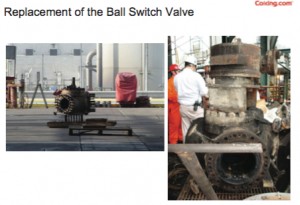 Reliability of the structure block equipment is covered in the Delayed Coker Operations and Reliability Training, a two-day course offered at RefComm® Budapest and in Los Angeles, USA. Because there is so much equipment used to perform coke drum operations, to decoke the drums, and the nature of the cracked resid is to turn solid at lower temperatures and velocities, this area of the refinery stereotypically has a large maintenance backlog.
Reliability of the structure block equipment is covered in the Delayed Coker Operations and Reliability Training, a two-day course offered at RefComm® Budapest and in Los Angeles, USA. Because there is so much equipment used to perform coke drum operations, to decoke the drums, and the nature of the cracked resid is to turn solid at lower temperatures and velocities, this area of the refinery stereotypically has a large maintenance backlog.
 Switch valves, feed isolation valves and overhead vapor valves are some of the main components that universally give all delayed cokers trouble. During the valve reliability section of the Delayed Coker training, there is always lengthy discussion and many questions about techniques and strategies to alleviate the plugging and over-torqueing of the valves.The steam purged valves (SP valves) are all dependent on constant steam pressure. Maintaining a constant amount of steam to each valve is very difficult because the steam used during valve movements can rob pressure from its neighboring valves. A good example is during a coke drum switch. When the hot cracked resid comes in contact with the prewarmed coke drum and the bottom un-heading device (BUD) the purge steam usage can spike as the gate and seats in the BUD react to the 300-degree temperature differential. All this steam usage can drain the supply and the process pressure may drop. If this happens even for a second, the SP valves may get cracked resid in the body cavity. Ensuring that the steam pressure is always a minimum of twenty pounds above the process pressure requires monitoring during the surveillance rounds.
Switch valves, feed isolation valves and overhead vapor valves are some of the main components that universally give all delayed cokers trouble. During the valve reliability section of the Delayed Coker training, there is always lengthy discussion and many questions about techniques and strategies to alleviate the plugging and over-torqueing of the valves.The steam purged valves (SP valves) are all dependent on constant steam pressure. Maintaining a constant amount of steam to each valve is very difficult because the steam used during valve movements can rob pressure from its neighboring valves. A good example is during a coke drum switch. When the hot cracked resid comes in contact with the prewarmed coke drum and the bottom un-heading device (BUD) the purge steam usage can spike as the gate and seats in the BUD react to the 300-degree temperature differential. All this steam usage can drain the supply and the process pressure may drop. If this happens even for a second, the SP valves may get cracked resid in the body cavity. Ensuring that the steam pressure is always a minimum of twenty pounds above the process pressure requires monitoring during the surveillance rounds.
Sometimes the issues are mechanical. If the check valve on the purge steam fails or is it in the wrong orientation, cracked resid may have been introduced to the steam header and then pushed into various valves on the branch connections from that header. If this happens, the header should be blown down.
TIP: It is most important to monitor the steam pressure during the coke drum switch and the bottom slide gate valve opening. Ensure the steam pressure controller can react quickly enough to maintain the proper amount of purge steam. One proven method – have a dedicated supply of high pressure steam that can be letdown and desuperheated to supply the purge steam header.
Learn more about this and other tips to increase the reliability of your unit – attend Delayed Coker Operations and Reliability Training (2-3 October 2017) at RefComm® Budapest and 5-6 December in Los Angeles, California. While in Los Angeles, stay one more day and attend Flowserve Decoking Equipment Operation and Reliability Training.








Leave a Reply
You must be logged in to post a comment.